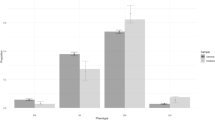Abstract
Objective:
Codeine O-demethylation to morphine is catalysed by the genetic polymorphic sparteine oxygenase (CYP2D6). The objective of the present study was to assess the analgesic effect of codeine on different types of experimental pain in relation to sparteine phenotype.
Methods:
Fourteen extensive (EMs) and 14 poor metabolizers (PMs) of sparteine completed a randomized, double-blind, three-way, cross-over study with a single oral dose of codeine (75 or 100 mg) against morphine (20 or 30 mg) and placebo. Pain tests performed before and 1, 2, 3, and 4 h after medication included the cold pressor test and pain thresholds for heat and pressure stimulation. Adverse effects were rated by a structured interview.
Results:
After morphine, morphine and morphine-6-glucuronide were present in equal amounts in plasma of PMs and EMs. After codeine, neither morphine nor morphine-6-glucuronide could be detected in 13 of the 14 PMs, whereas at least one of the compounds could be detected in all EMs. Peak pain and discomfort rated on a VAS scale during the cold pressor test were significantly reduced by morphine in both EMs and PMs, with a median peak change of 8.5 and 7.0 mm, respectively, for peak pain, and 11.5 and 15.5 mm, respectively, for discomfort. Codeine only reduced these pain measures significantly in EMs, with a median peak change of 5.5 mm for peak pain and 10.5 mm for discomfort. Pain detection and tolerance thresholds to heat and pressure were not consistently altered by either morphine or codeine. In PMs, adverse effects were significantly more pronounced on morphine than on codeine and only showed a slight difference between codeine and placebo. In EMs, there was no difference between codeine and morphine and more pronounced adverse effects on both drugs as compared to placebo.
Conclusions:
This study confirms that codeine O-demethylation depends on CYP2D6; it shows that the 6-glucuronidation of morphine is independent of CYP2D6; it supports the theory that the analgesic effect of codeine depends on its O-demethylation; and it indicates that this is probably also the case for the adverse effects. The resuls lend no support to the suggestion of a non-opioid analgesic effect of codeine.
Similar content being viewed by others
Author information
Authors and Affiliations
Additional information
Received: 25 January 1996/Accepted in revised form: 14 June 1996
Rights and permissions
About this article
Cite this article
Poulsen, L., Brøsen, K., Arendt-Nielsen, L. et al. Codeine and morphine in extensive and poor metabolizers of sparteine: pharmacokinetics, analgesic effect and side effects. E J Clin Pharmacol 51, 289–295 (1996). https://doi.org/10.1007/s002280050200
Issue Date:
DOI: https://doi.org/10.1007/s002280050200




